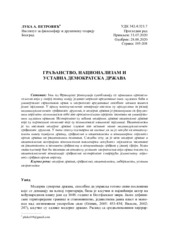Приказ основних података о документу
Građanstvo, nacionalizam i ustavna demokratska država
| dc.creator | Petrović, Luka | |
| dc.date.accessioned | 2021-03-10T16:06:50Z | |
| dc.date.available | 2021-03-10T16:06:50Z | |
| dc.date.issued | 2020 | |
| dc.identifier.issn | 1820-4589 | |
| dc.identifier.uri | http://rifdt.instifdt.bg.ac.rs/123456789/2157 | |
| dc.description.abstract | Још од Француске револуција сукобљавају се принципи просветитељства који у својој основу имају једнако морално вредновање свих људских бића и универзално гарантована права и патриотско вредновање посебног начина живота једне заједнице. У крилу апсолутистичке монархије настали су предуслови за развој индивидуалистичког грађанског друштва, а модерна држава је раскинувши са феудалним поретком легитимисала себе као просветитељски пројекат заснован на универзалним људским правима. Истовремено су већина модерних државе националне државе које су спроводиле политике које су асимиловале мањинске заједнице. Национализам је од настанка модерне државе служио као везивно ткиво индивидуалистичког грађанског друштва. У овом тексту одговарам на питање да ли је могуће на концептуалном нивоу одвојити државу, грађанство и национализам и конципирати лојалност према држави на рационалним основама. Следећи тезу да је веза модерне државе и национализма историјски контингентна анализирам могућност лојалности засноване на рационалном и активном грађанству и комуникацији грађана у јавној сфери. Један такав одговор био би заснован на концепту уставног патриотизма који прави отклон од националистичке концепције грађанства истовремено стварајући јединствену лојалност грађана према поретку. | sr |
| dc.description.abstract | Since the French Revolution, the principles of the Enlightenment which were based on the equal moral evaluation of all human beings and universally guaranteed rights clashed with the patriotic value of the special way of life of a community. Under the absolutist monarchy, the preconditions for the development of an individualistic civil society were created, and the modern state, breaking with the feudal order, legitimized itself as an enlightenment project based on universal human rights. At the same time, most modern states are nation-states which were pursuing policies that assimilated minority communities. Since the emergence of the modern state, nationalism has served as the connective tissue of individualistic civil society. In this paper, I answer the question of whether it is possible on a conceptual level to separate the state, citizenship and nationalism and to conceptualize loyalty to the state on rational grounds. Following the thesis that the connection between the modern state and nationalism is historically contingent, I analyze the possibility of loyalty based on rational and active citizenship and communication of citizens in the public sphere. One such answer would be based on the concept of constitutional patriotism, which deviates from the nationalist conception of citizenship while creating a unique loyalty of citizens to the polity. | sr |
| dc.language.iso | sr | sr |
| dc.publisher | Novi Sad: Kultura - Polis | sr |
| dc.publisher | Beograd: Institut za evropske studije | sr |
| dc.relation | info:eu-repo/grantAgreement/MESTD/inst-2020/200025/RS// | sr |
| dc.rights | openAccess | sr |
| dc.rights.uri | https://creativecommons.org/licenses/by-nc-nd/4.0/ | |
| dc.source | Kultura polisa | sr |
| dc.subject | модерна држава | sr |
| dc.subject | грађанство | sr |
| dc.subject | национализам | sr |
| dc.subject | либерализам | sr |
| dc.subject | уставни патриотизам | sr |
| dc.title | Građanstvo, nacionalizam i ustavna demokratska država | sr |
| dc.type | article | sr |
| dc.rights.license | BY-NC-ND | sr |
| dcterms.abstract | Петровић, Лука; Грађанство, национализам и уставна демократска држава; Грађанство, национализам и уставна демократска држава; | |
| dc.citation.issue | 43 | |
| dc.citation.volume | 17 | |
| dc.citation.spage | 195 | |
| dc.citation.epage | 208 | |
| dc.type.version | publishedVersion | sr |
| dc.identifier.fulltext | http://rifdt.instifdt.bg.ac.rs/bitstream/id/7728/2-7PetrovicL.pdf | |
| dc.identifier.rcub | https://hdl.handle.net/21.15107/rcub_rifdt_2157 |

